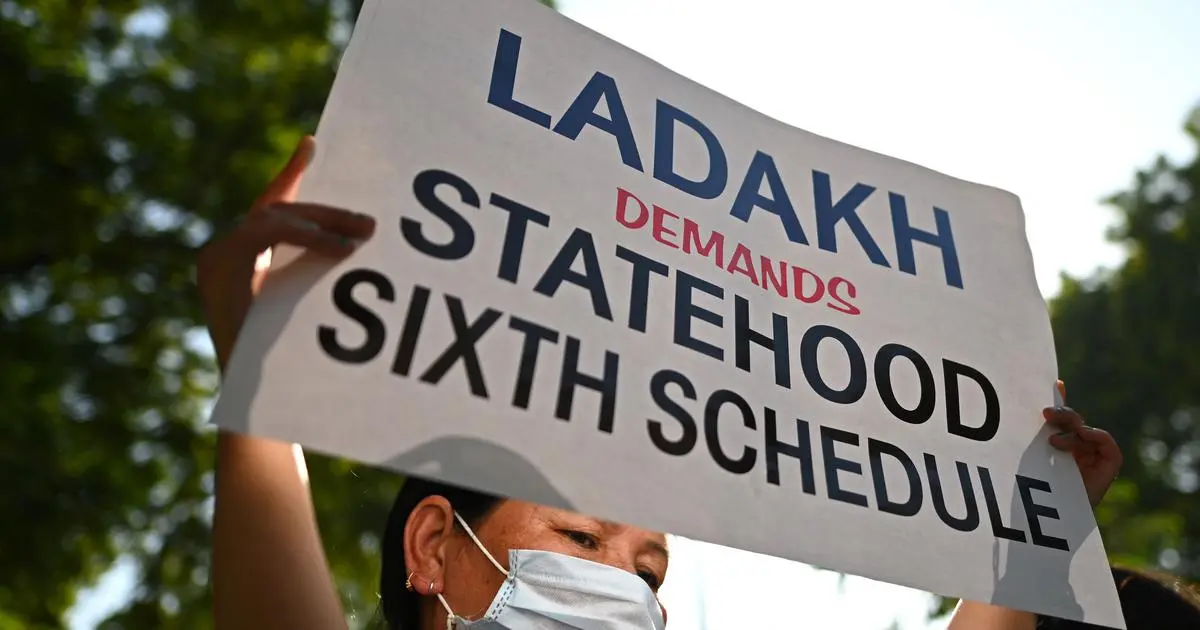In the high-altitude landscape of Ladakh, a political storm has been brewing, centered on a powerful demand: inclusion in the Sixth Schedule of the Constitution to protect the region’s unique tribal identity and land. Protests have been a common sight. But a recent revelation has added a stunning twist to this story. According to official documents from 2019, the highest levels of the Indian government—including the Ministries of Home, Tribal Affairs, and Law—had once agreed that this demand was justified. This case study investigates this major political reversal, exploring why a consensus to grant constitutional protection was quietly shelved, and what it tells us about the politics of tribal rights in India’s strategic frontiers.
The Information Box
Syllabus Connection:
- Paper 2: Chapter 6.2 (Tribal Administration: Sixth Schedule), Chapter 9.3 (Tribal Movements, Regionalism)
- Paper 1: Chapter 4 (Political Anthropology: State, Power, Politics of Identity), Chapter 9 (Applied Anthropology)
Key Concepts/Tags:
- Sixth Schedule, Ladakh, NCST, Tribal Rights, Land Alienation, Identity Politics, Autonomous Hill Development Council (LAHDC)
The Setting: Who, What, Where?
The setting is the Union Territory of Ladakh, a strategically vital region where over 97% of the population is designated as Scheduled Tribes. The central issue is the persistent popular demand for the inclusion of Ladakh under the Sixth Schedule of the Constitution, which would create an autonomous tribal region with significant powers over land, forests, and local governance. The key actors are the people of Ladakh, the National Commission for Scheduled Tribes (NCST), and the Union Government, particularly the Ministry of Home Affairs. The critical piece of evidence is the minutes of the 119th NCST meeting held on September 11, 2019, which revealed a previously unknown consensus.
The Core Argument: Why This Study Matters
This is a critical case study on the politics of tribal administration and the shifting nature of political will.
- The Revealed Consensus and Subsequent Reversal: The central finding is the stark contradiction in the government’s stance. The 2019 NCST minutes reveal a rare moment of consensus where the Ministries of Home, Tribal Affairs, and Law had “no objection” to granting Sixth Schedule status. This makes the government’s subsequent public actions—first downplaying the need (late 2019), then promising it in an election manifesto (2020), and finally rejecting it outright (2022)—a clear and documented political U-turn.
- A Clash of Models: Rights vs. Development: The case perfectly illustrates a fundamental conflict in Indian tribal policy. The people of Ladakh and the NCST are demanding a rights-based model focused on constitutional safeguards, political autonomy, and the protection of their land and identity from outsiders. The government’s final argument, however, is based on a developmentalist model. It essentially argues that providing “sufficient funds” and ensuring “socio-economic development” is an adequate substitute for constitutional rights and political self-determination.
- The Unspoken Strategic Angle: An unstated but crucial context is Ladakh’s immense strategic importance, especially following the 2020 border clashes with China. The central government’s reversal can be interpreted as a desire to maintain tight, centralized control over a sensitive border region, viewing the extensive political autonomy granted by the Sixth Schedule as a potential administrative and security risk.
The Anthropologist’s Gaze: A Critical Perspective
- The State’s “Developmentalist” Ideology: An anthropologist would analyze the government’s final justification as a classic example of a “developmentalist” ideology. This is a mode of governance that legitimizes state power by framing its actions in terms of providing economic development and welfare, while simultaneously dismissing or downplaying demands for political rights and autonomy. It is a way of saying, “We will provide for you, but we will not empower you.”
- Identity vs. Administration: The core demand from Ladakh is not just about better administration; it is a profound quest for the legal and constitutional recognition of their distinct tribal identity. The Sixth Schedule is the most powerful symbol of this recognition. The government’s response, by focusing on the administrative powers of the existing LAHDC and the provision of funds, fundamentally misreads—or wilfully ignores—this deeper struggle for identity protection.
- The “Promise” as a Political Tool: The BJP’s 2020 election manifesto promise is a key piece of ethnographic data. A political anthropologist would see this not just as a broken promise, but as evidence of how sacred constitutional safeguards like the Sixth Schedule can be instrumentalized and used as bargaining chips in the electoral process—promised to win votes, but denied when politically or strategically inconvenient.
The Exam Angle: How to Use This in Your Mains Answer
- Types of Questions Where It can be used:
- “Critically evaluate the functioning and significance of the Sixth Schedule in protecting tribal interests.”
- “The relationship between the state and tribal communities in India is often marked by a conflict between a rights-based and a welfarist approach. Discuss.”
- GS-2: “Analyze the challenges to cooperative federalism in the context of Union Territories.”
- Model Integration:
- On the Sixth Schedule (Paper 2): “The demand for Sixth Schedule status in Ladakh highlights its significance as a tool for protecting tribal land and identity. The government’s eventual rejection of the demand, despite an initial consensus revealed by the NCST in 2019, showcases the political complexities and the clash between a rights-based approach to autonomy versus a purely developmentalist approach from the state.”
- On Tribal Politics: “The political journey of the Sixth Schedule demand for Ladakh illustrates how constitutional safeguards can become subjects of electoral politics. After an initial agreement by central ministries in 2019, the promise was used in a 2020 election manifesto, only to be later denied, framing the issue as a conflict between the people’s demand for political autonomy and the state’s focus on administrative development.”
- For GS-2 (Federalism): “The case of Ladakh’s demand for Sixth Schedule status reveals a significant tension in India’s federal structure. Despite an initial concurrence from the NCST and key Union Ministries in 2019, the central government later reversed its stance, arguing that developmental funds were a sufficient substitute for constitutional safeguards, raising critical questions about the nature of autonomy in strategic border regions.”
Observer’s Take
The story of Ladakh’s Sixth Schedule demand is a poignant case study in the politics of promises. The revelation of the 2019 consensus shows that the demand was not just a local aspiration but was, for a brief but crucial moment, seen as a constitutional necessity by the very ministries now opposing it. The subsequent reversal exposes a deep and troubling dilemma at the heart of the state’s tribal policy: is the ultimate goal to empower tribal communities with inalienable rights and autonomy, or is it to manage them with funds and development schemes? For the people of Ladakh, the Sixth Schedule is not just a law; it is a shield to protect their land, their culture, and their future in a rapidly changing and strategically sensitive landscape. The state’s unwillingness to grant it, after having once agreed, speaks volumes about the contested and fragile nature of tribal rights in modern India.





